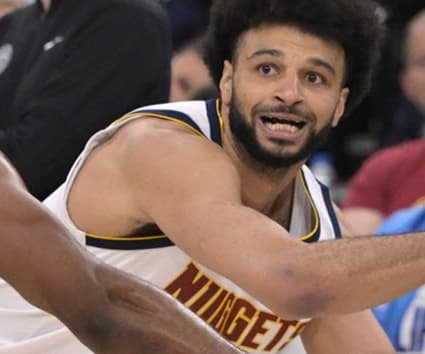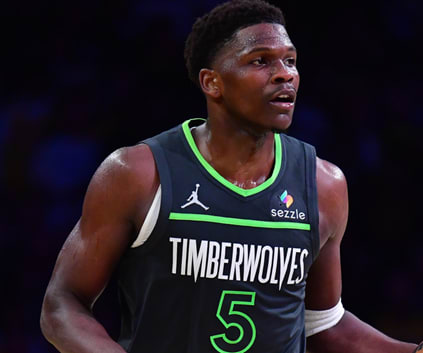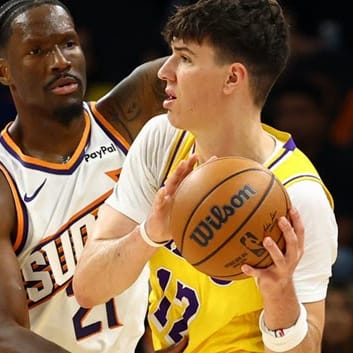Questionable
Injury Undisclosed
Est. Return 1/18/2026
2025 Stats
PTS
9.9
REB
3.1
AST
2.9
STL
1.4
BLK
0.4
ROS Projections
2025 Fantasy Outlook
Smart joins the Lakers for the 2025-26 season, looking to put a stretch of injuries and uneven performances behind him. The veteran guard appeared in 34 regular-season games (seven starts) between the Grizzlies and Wizards last year, averaging 9.0 points, 3.2 assists, 2.1 rebounds and 1.1 steals while shooting 39.3 percent from the field and 34.8 percent from deep in 20 minutes per appearance. A string of injuries has limited him to just 54 regular-season contests over the past two years, disrupting his ability to find a consistent rhythm and form. After agreeing to a buyout with Washington in July, Smart signed with Los Angeles to bolster the team's backcourt depth and provide a steady veteran presence. The Lakers' starting guard spots are secure with superstar Luka Doncic and rising star Austin Reaves, but there's still uncertainty behind them with Gabe Vincent, Dalton Knecht and Bronny James all vying for rotation roles. At age 31, Smart might not carry the same offensive upside as some younger options, but he brings elite defensive credentials as a three-time All-NBA Defensive Team selection and the 2021-22 Defensive Player of the Year. Expect him to serve primarily as a defensive specialist who can provide occasional scoring bursts, with steady offense more of a bonus than a nightly guarantee. Read Past Outlooks

Doesn't return Saturday
Smart (undisclosed) exited to the locker room in the fourth quarter of Saturday's 132-116 loss to the Trail Blazers and did not return.
ANALYSIS
Smart was one point shy of matching his season-high mark before limping to the locker room with 7:56 remaining in the contest. The veteran guard finished with 25 points (9-17 FG, 4-6 3Pt, 3-5 FT), two rebounds and one steal across 25 minutes. He returned to the bench late in the fourth, though his status will be worth monitoring ahead of Sunday's game against Toronto.
Smart was one point shy of matching his season-high mark before limping to the locker room with 7:56 remaining in the contest. The veteran guard finished with 25 points (9-17 FG, 4-6 3Pt, 3-5 FT), two rebounds and one steal across 25 minutes. He returned to the bench late in the fourth, though his status will be worth monitoring ahead of Sunday's game against Toronto.
NBA Per Game Stats
Per Game
Total
Per 36
NBA Per Game Stats
Loading Per Game Stats...
2025 NBA Game Log
2025
2024
2023
2022
2021
2020
2019
2018
2017
2016
2025 NBA Per Game Split Stats
Schedule
By Month
Starting/Off Bench
Days Rest
Vs Opp
By Result
2025 NBA Per Game Split Stats
Loading Split Stats...
Advanced Stats
Loading Advanced Stats...
Stat Review
2025
2024
2023
2022
2021
2020
2019
2018
2017
2016
How does Marcus Smart compare to other players?
This section compares his stats with all players from the previous three seasons (minimum 200 minutes played)*. The bar represents the player's percentile rank. For example, if the bar is halfway across, then the player falls into the 50th percentile for that stat and it would be considered average.
True Shooting %
54.9%
Effective Field Goal %
49.4%
3-Point Attempt Rate
66.2%
Free Throw Rate
25.5%
Offensive Rebound %
2.8%
Defensive Rebound %
9.9%
Total Rebound %
6.4%
Assist %
13.7%
Steal %
2.2%
Block %
1.2%
Turnover %
12.8%
Usage %
15.5%
Fantasy Points Per Game
21.3
Fantasy Points Per Minute
0.7
NBA Historical Fantasy Stats
Historical ADP
Loading Historical ADP...
Lakers Depth Chart
Our full team depth charts are reserved for RotoWire subscribers.
Subscribe Now
Lakers Rotation: Minutes Breakdown
Loading Lakers Rotation Data...
Average Fantasy Points
Minutes
FanDuel
DraftKings
Yahoo
FantasyDraft
Head2Head
Sorare
Average Fantasy Points are determined when Marcus Smart was active vs. non-active during the season. Click here to view average fantasy points for a different time period.
Loading Average Minutes...
Past Fantasy Outlooks
2024
2023
2022
2021
2020
2019
2018
2017
2016
2015
2014
Smart's first season in Memphis was one to forget, playing just 20 games due to ankle and finger injuries. When healthy, Smart was on brand, averaging 14.5 points, 2.7 rebounds, 4.3 assists, 2.1 steals and 2.1 three-pointers on 43.0 percent shooting. However, it should be noted that the small uptick in offensive production came when Ja Morant was sidelined, something that Memphis will be trying to avoid this season. Assuming the Grizzlies are healthy to start the season, Smart should still be able to log starter's minutes on most nights, despite the fact he may come off the bench. His scoring will once again take a backseat to his defensive output, something that doesn't always translate to fantasy value. He is who he is at this point, an inefficient, low-volume scorer who offers elite defensive numbers and moderate upside in both assists and threes. Smart remains a viable asset in the latter half of drafts, providing value anywhere after pick 90.
More Fantasy News

Exits to locker room
Smart (undisclosed) exited to the locker room in the fourth quarter of Saturday's game against the Trail Blazers, Broderick Turner of the Los Angeles Times reports.
ANALYSIS
Subscribe now to instantly reveal our take on this news.
Subscribe now to instantly reveal our take on this news.

Struggles in loss
Smart notched one point (0-5 FG, 0-3 3Pt, 1-2 FT), two rebounds, two assists and two steals in 31 minutes during Monday's 124-112 loss to the Kings.
ANALYSIS
Subscribe now to instantly reveal our take on this news.
Subscribe now to instantly reveal our take on this news.

Muted performance in loss
Smart ended Wednesday's 107-91 loss to San Antonio with two points (1-6 FG, 0-3 3Pt), seven rebounds, one assist and three steals in 34 minutes.
ANALYSIS
Subscribe now to instantly reveal our take on this news.
Subscribe now to instantly reveal our take on this news.

Making regular starts
Smart produced six points (1-5 FG, 0-3 3Pt, 4-4 FT), one rebound, four assists and one block in 31 minutes during Sunday's 120-114 victory over the Grizzlies.
ANALYSIS
Subscribe now to instantly reveal our take on this news.
Subscribe now to instantly reveal our take on this news.

Starting Sunday
Smart will start Sunday's game against the Kings, Dan Woike of The Athletic reports.
ANALYSIS
Subscribe now to instantly reveal our take on this news.
Subscribe now to instantly reveal our take on this news.
Latest Fantasy Rumors

Praised for defensive effort
Smart's effort on the defensive end during Friday's win over the Timberwolves didn't go unnoticed, Thuc Nhi Nguyen of the Los Angeles Times writes.
ANALYSIS
Smart knows he's not going to fill the stat sheet anymore, but he showed his worth on defense Friday against Anthony Edwards and the Timberwolves. "Unfortunately, my stats aren't going to do me any justice, so I try not to worry about it," he said. "I just try to go out there, and like I said, do what I'm supposed to do, and help my teammates out the best way I can." Smart has played off the bench in the Lakers' first two games of the season, and he might remain in that role as long as he continues to be an impactful player on the defensive end.
Smart knows he's not going to fill the stat sheet anymore, but he showed his worth on defense Friday against Anthony Edwards and the Timberwolves. "Unfortunately, my stats aren't going to do me any justice, so I try not to worry about it," he said. "I just try to go out there, and like I said, do what I'm supposed to do, and help my teammates out the best way I can." Smart has played off the bench in the Lakers' first two games of the season, and he might remain in that role as long as he continues to be an impactful player on the defensive end.















